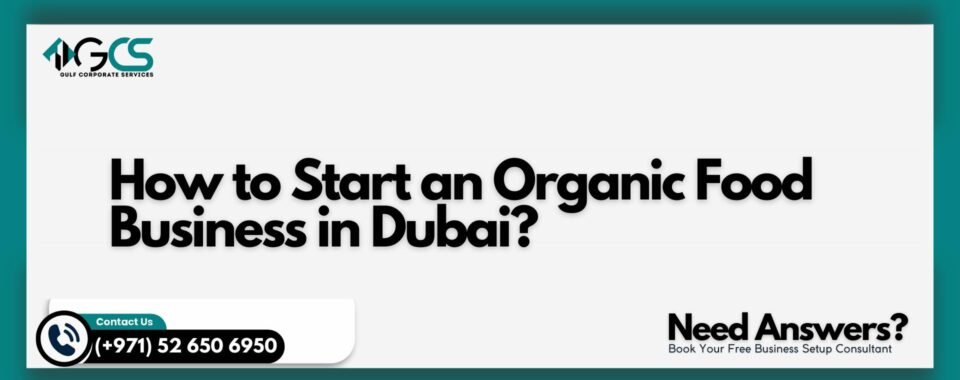
Starting an organic food business in Dubai is more than just a trend—it’s a smart move. With more people looking for healthy and sustainable choices, organic products are in high demand across supermarkets, cafes, and online platforms. Whether you’re planning to sell fresh produce, organic snacks, or even launch a health-focused café, the market is ready.
In this guide, we’ll walk you through everything you need to know—from legal steps to licenses, costs, and practical tips to grow your brand in the UAE.
Why Choose Dubai for Your Organic Food Business?
Dubai is a global hub. People here care about what they eat. Health-conscious consumers, expats, tourists, and families all look for high-quality organic options. The government also supports sustainable farming and clean food initiatives, making it easier for organic-focused brands to grow.
Some reasons why Dubai is ideal:
- Rising awareness of organic and chemical-free products
- Strong demand from gyms, cafes, and online food buyers
- Access to import/export hubs for sourcing or distributing goods
- Supportive licensing structure for small and medium enterprises
Decide on Your Business Model
The first step is to choose what type of organic food business you want to run. You can go for:
- An organic grocery store
- A home-based delivery brand
- A physical or cloud kitchen
- A health café or restaurant
- Online e-commerce for packaged or imported goods
- Wholesale or distribution to hotels and supermarkets
Define your niche early. It helps when applying for licenses and finding the right location or setup.
Legal Steps and Licensing
To operate legally in Dubai, you must register your business with the right authorities. Organic food falls under specific categories like food trading, retail, or hospitality, depending on your business model.
Step 1: Choose a Business Structure
Most food businesses start as:
- LLC (Limited Liability Company) – Ideal for retail or dining
- Sole Proprietorship – Suitable for small home-based startups
- Free Zone Company – Good for online or import/export-focused models
Step 2: Apply for Trade License
You’ll need a food trading license or a restaurant/café license depending on the nature of your business. The license is issued by:
- Dubai Department of Economy and Tourism (DET) – for mainland businesses
- Free zone authority – if setting up in an economic zone like DMCC, DAFZA, etc.
Step 3: Food Safety and Approvals
For any food-related business, you must get approval from Dubai Municipality – Food Control Department. They check hygiene standards, storage systems, and the food safety plan.
If you’re selling certified organic products, you’ll also need approvals from:
- Emirates Authority for Standardization and Metrology (ESMA)
- Ministry of Climate Change and Environment (MOCCAE) (for imports)
Find the Right Location
Your store or café must meet food hygiene and municipal layout rules. Choose locations with foot traffic if you’re doing walk-in sales (like Jumeirah, Al Barsha, or Business Bay). For online or delivery-based models, a commercial kitchen or warehouse may be enough.
Note: Home kitchens aren’t allowed for commercial food production in Dubai.
Importing Organic Goods
Planning to import organic food from abroad? Here’s what you’ll need:
- Import Code (issued by Dubai Customs)
- Food Importer License
- Approval from Food Safety Department
- Organic certification documents from the country of origin
Every product you import must be registered in the Food Import and Re-export System (FIRS).
Cost of Starting an Organic Food Business in Dubai
Here’s an estimated breakdown for a small-to-medium business:
| Expense | Cost Range (AED) |
| Trade License & Registration | 10,000 – 15,000 |
| Ejari/Lease for Shop or Kitchen | 20,000 – 50,000/year |
| Municipality & Food Safety Fees | 2,000 – 5,000 |
| Stock & Equipment | 30,000 – 80,000 |
| Marketing & Branding | 5,000 – 10,000 |
Total initial investment: Approx. AED 70,000 – AED 150,000, depending on the scale.
Marketing and Growing Your Business
In a competitive space like organic food, branding and trust matter. Here’s how to build your presence:
- Social Media Marketing: Use Instagram and TikTok to share behind-the-scenes, health tips, and customer stories.
- Local SEO: List your business on Google Maps, Zomato, and Dubai-based food directories.
- Collaborate: Partner with gyms, wellness influencers, and cafés for brand visibility.
- Loyalty Programs: Offer points, discounts, or free deliveries for repeat customers.
- Certifications: Display your organic certifications clearly. It builds trust.
Tips for Success
- Source from reliable organic farms or suppliers—both local and international.
- Keep hygiene, shelf life, and packaging a priority.
- Offer subscription-based delivery models for loyal customers.
- Make your brand about clean, honest, and real food.
Conclusion
The future of food in Dubai is organic, healthy, and sustainable. If you’re planning to step into this space, now is the perfect time. From legal setup and licensing to branding and growth, every step plays a role in building a trusted, profitable organic food business. With the right Business Setup in Dubai and a strong commitment to quality, you can build something meaningful—and successful. Whether it’s a café, store, or delivery-based model, starting your organic food business in Dubai gives you a chance to serve a health-conscious market and make a real impact.








